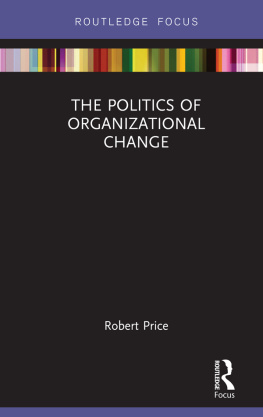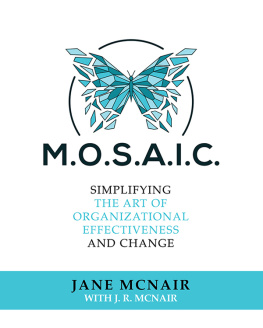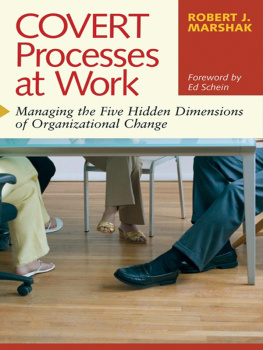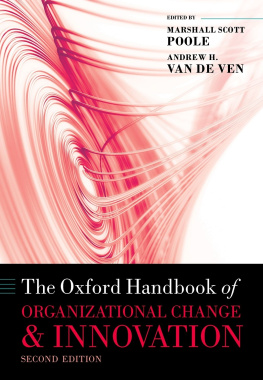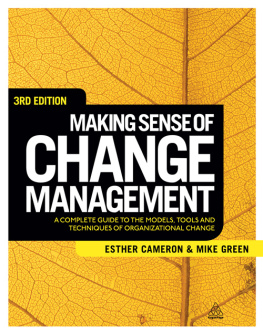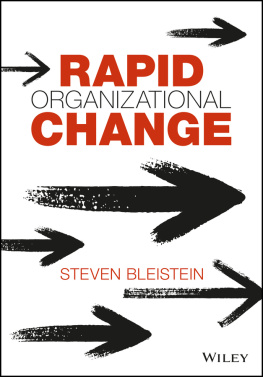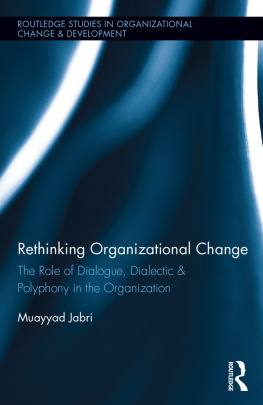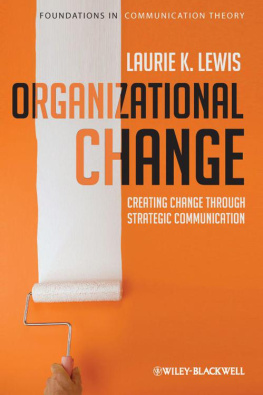I am grateful to a number of friends and colleagues who, over the years, have listened to my views on self-interest and politicised conformance, and who have encouraged, and in some cases cajoled, me to put my thoughts into words. If it were not for their forbearance and encouragement, I would not have written this bookI thank you.
1
Self-Interest and Political Behaviour
This chapter discusses how we learn and develop politicised behaviour at work, in that it is experiential, reflexive and reflective in nature. Individuals within organizations learn through the shaping forces that exist within extant and developing networks, for example, through stories told by colleagues, memes, interpretation and interpolation, general and specific discourse, transmission chains, tone set by active constructors, actors and actants. The learning process of organizational politics also helps individuals to identify specific political behaviour that is associated with positive and/or negative attendant consequences, which is a key part of the learning process that enables individuals to fit perceived organizational politicised requirements. Individuals identify, and in a broad sense accept political normsa form of acculturation takes place within work environments. Bolman and Deal (1997, p163) put forward that organizational politics relates to five elements: (1) coalitions of individuals and interest groups, (2) existence of differences between members, (3) most important decisions relate to scarce resources, (4) power is the most important resource, (5) goals and decisions come through bargaining, negotiation etc. The elements relate to strategic decision-making; however, there is a recognition across all five elements that individuals pursue their own agenda, and do so based on degrees of self-interest or, perhaps at best, enlightened self-interest. Irrespective of how one may view the reasoning behind individual or actions of coalitions, self-interest is present to a lesser or greater degree, and is determined and controlled by individuals through self-control, and, it should be recognised, by key actors with personal leadership power.
Before further discussion, it is necessary to define self-interest in order that there is clarity and consistency in the way it relates to organizational politics and change. In a broad sense, self-interest covers advantage to self when making and taking decisions; it may include egoism, materialism and rationality, and encompasses forms of enlightened self-interest. Following on from this, and for the purpose of this book, The Routledge Encyclopaedia of Philosophy (1998) definition is used. [W] hat is in a persons interests, to well-being and also relates to: a motive or disposition of character: persons are said to act from self-interest when they aim at their own good or to be self-interested when they are disposed to pursue their own good.
The definition also highlights that individuals identities are constituted by a variety of roles, relations and commitments, and in different institutional contexts under different descriptions individuals can have distinct and sometimes conflicting conceptions of their interests (ONeill, 2001). ONeills definition is pertinent to the core theme of the discussion throughout this book, in that it highlights the inherent conflict that resides within individuals when considering the way in which they consciously orient their political behaviour and inherent decisions about the degree to which they conform in terms of political behaviour. An individuals politicised behaviour orientation, however, is not fixed; context and changes to context will determine the form it takesit is a controlled malleable force within self. The other aspect to this is the degree to which self-interest shapes individual agenda in relation to organizational goals. As Cyert and March (1963) highlighted, Organizations do not have objectives, people do. Individual objectives in relation to organizational objectives require individuals to, depending on agenda, perform proskynesis, but the performance is one that is owned and largely controlled by individuals. However, there is duality of control through self and self-determinate orientation in relation to organizational line management through hierarchy, which manifests itself through degrees of control and power given to organizations through individual and collective politicised conformance. will explore this aspect further.
The concept of self-interest, even though political aspects are not specifically referred to, can be summarised through Balogun and Hope Haileys (2004, p149) iteration of Beckhard Harris (1987) Change Equation, which identifies three key components of individual reaction to change. The three elements, relative to the nature of change and its impact on individuals, are: (1) the degree to which an individual is satisfied/dissatisfied with the current state, (2) the degree to which the change is desirable, (3) whether or not change is practical. Individuals relate the three elements directly to the perceived cost to self. The degree of cost may then manifest itself in degrees of resistance, whether overt and/or covert. This is not necessarily a binary choice, but nuanced through politicised conformance behaviour: individuals will determine their degree of resistance in relation to the importance they attach to those aspects of the required change that disrupts their satisfaction with the current state. This process takes place irrespective of the change approach used; it is an inescapable aspect of the reality of individual reaction to change measured in terms of what does it mean for me? This also equates to Lewins (1951) Field Theory in terms of hostility to change that is within the restraining forces field; the idea being, of course, to identify the forces that may create resistance to the forces driving change. Lewins Field Theory has been criticised for being a top-down approach, only suitable for stable environments and first order change and for not, at least overtly, considering organizational politics and power. Burnes (2004), however, reappraises Lewins concept and challenges the assumptive criticism that it is a simplistic three-stage approach. Burnes highlights that Lewin viewed change as non-linear and as unpredictableself-interest that manifests itself through politicised conformance adds to non-linearity and unpredictability, and challenges the degree of managerial control outside of hierarchical line management. The problem, however, is not one of identifying resistance, but the degree to which individuals are resisting in an overt politicised way: outwardly espousing their understanding for the need to change, but inwardly not accepting, or fully accepting, the change due to the disruption it causes to individuals, for example, seemingly inconsequential issues such as desk space.
However, this does not mean that individuals do not understand an organizations rationale for change, or even do not understand how change relates to organizational goals. The issue is one to do with personal loss of those aspects of an individuals work routine and networks within formal organizational spaces that are not only valued by individuals, but also enable work to be undertaken efficiently and effectively, even in terms of work that takes place within liminal spaces within organizations. Placing individuals at the centre of change in a political sense raises the issue of the degree of control organizations have through planned change. There is, of course, control, through politicised conformancemore on this laterbut not to the extent to which managers think, or perhaps, choose to think. Choosing to assume there is control through planned change predicated on hierarchical power is a safer and easier place to reside as part of organizational dominant spaceit is a form of managerial oikeiosis. Oikeiosis will be discussed later in the chapter.

